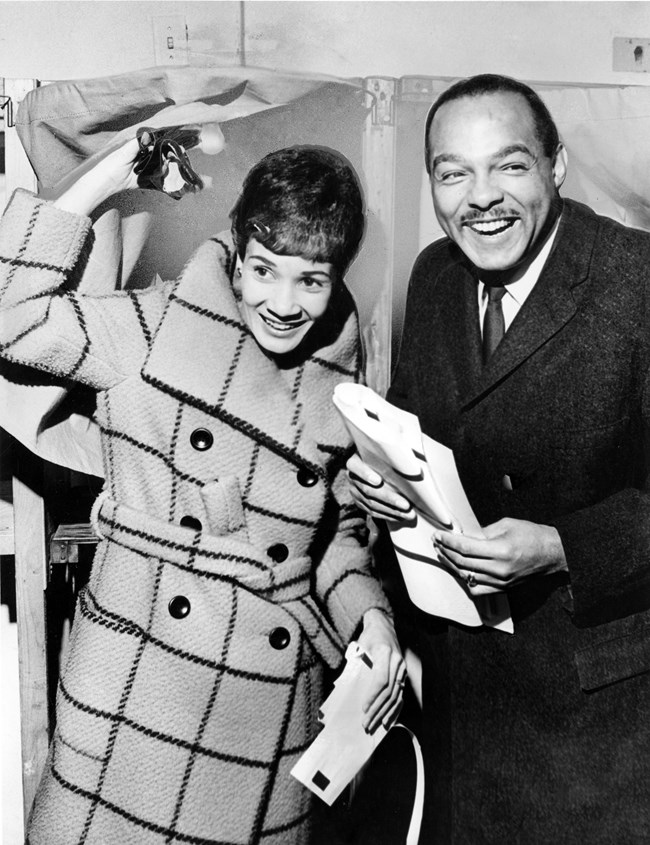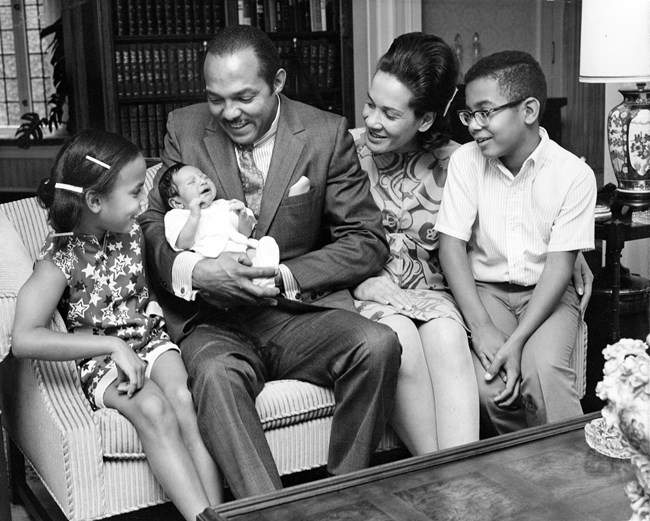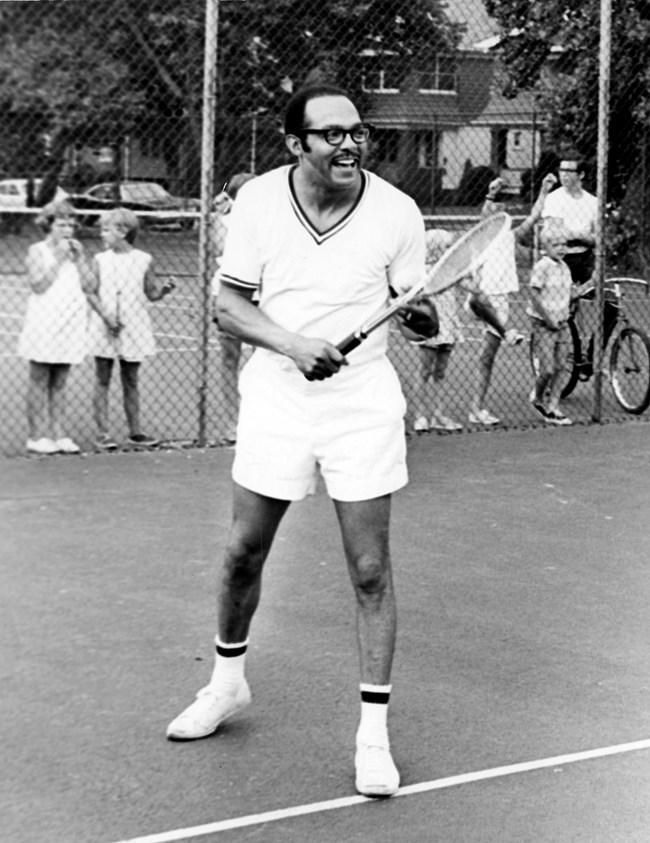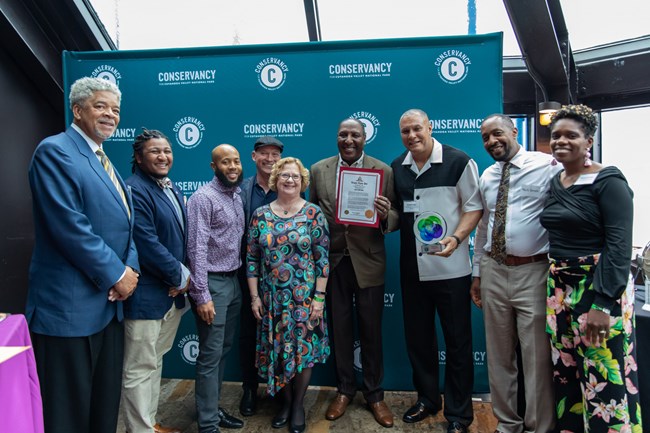Last updated: July 8, 2024
Article
Cordell Stokes: Memories of My Father, Carl B. Stokes

Cleveland State University / Michael Schwartz Library
Brothers Carl and Louis Stokes rose from their childhood in Cleveland’s public housing to become influential Black politicians. By advocating for better conditions for poor people living in cities, they were pioneers in what is now called “environmental justice.” Carl B. Stokes is most famous for using the 1969 Cuyahoga River fire to advocate for a broad range of issues impacting the “urban environment.”
What kinds of personal experiences shaped Carl Stokes? Who influenced his views? Did the family enjoy time outdoors? To help us better interpret Carl’s legacy, Cuyahoga Valley National Park recorded an oral history with his son Cordell Stokes in 2021. Cordell is an accomplished Cleveland-area businessman who has worked in both government relations and business. This article highlights some of the insights he graciously provided.

Cleveland State University / Michael Schwartz Library
Growing Up in the Stokes Family
Cordell Edward Stokes was born in Cleveland, Ohio in 1969, the youngest child of Carl and his first wife, Shirley. His brother Carl Jr. (born in 1958) and his sister Cordi (born in 1961) grew up in the public eye during their father’s political career. Cordell was only four when his parents divorced, and his father was given custody of the children. Carl died when Cordell was about 25 years old, a college student on a basketball scholarship.
Cordell remembered his father as someone who perfected the balance of his career with a disciplined family life. “Growing up with him in the big city of New York, especially in the 1970s. Watching his activities as a professional and then off-site from work. . . . He provided a great foundation for us on all levels for us to be able to deal with life, not as special people but as people like everyone else.”
Congressman Louis Stokes was like a second father to Cordell. Cordell would fly to Washington D.C. or Cleveland to participate in his uncle’s political activities. Carl and Louis both ensured that Cordell knew he would need to develop his own talents.
-
Life Lessons
Cordell describes two key life lessons that Carl and Louis Stokes impressed upon him.
Personal Heroes
Carl was a “heavy reader of all books.” He taught Cordell about his personal heroes, starting at a young age. There were “four very important Black individuals that I had to learn as soon as I could started reading and comprehending. He always talked to me as an adult, not of kiddie stuff. And that was Paul Robeson, Toussaint Louverture, . . . of course Martin Luther King, and . . . the local John O. Holly.”
John O. Holly was a Black political activist who was popular in the Cleveland housing projects when Carl was a young man. Holly led boycotts against White-owned businesses and battled unions who refused to hire Black employees. “He took a mentor-protégé relationship with my father when Mr. Holly was doing work for then Governor Rhodes,” Cordell said, “If anything derived to drive [Carl] to become either a good public speaker or an activist etc., the foundation was with John O. Holly and those who might have been close to him.”

Cleveland State University / Michael Schwartz Library
A Shared Love of Sports
According to Cordell, Carl was always doing something in his spare time. He recalled how much his father enjoyed sports, sharing this passion with his children. Carl was a “big-time tennis observer and player.” As a parent, he was very engaged in Cordell’s high-level career as a student-athlete in basketball and football.
At West Virginia State College, Carl had been middle-weight boxing champion. “He was a boxer by nature.” Cordell remembers going to the gym together to box. Carl was also “a fantastic pool player to the point where he was playing against some of the world-renowned, historic pool players.” As a newsman, he played softball on the NBC team in Central Park. As he got older, Carl got involved in tinkering around the house, working in the yard, and building things in his woodshop.
-
A Memorable Serve
Cordell Stokes recalls a funny incident on a family tennis trip to Jamaica.
Exploring Nature
Cordell described fond childhood memories of nature, especially when his family lived in New York. He often played in the 1000-acre Van Cortlandt Park in the Bronx, as well as in Central Park. Both had rocks and forest. They swam at the public beaches in The Hamptons. There were also family trips filled with nature. “With my father, we used to go up into upstate New York. We had a cousin who lived up there and he had a cabin. We would go out hunting off of that. We would travel, of course, to the Grand Canyon and other places.”
He remembers attending a sports camp in the 1970s. “The camp always incorporated being able to introduce you into the wild. . . . You would stay a week in a cabin somewhere with other kids. They’d show you berries that you’d eat and things of that sort. It stayed with me. I'm very oriented into wild game. I’m a big health nut. All of the things that the Earth has to present itself.”
Now, during the summers at home in Ohio, Cordell said that he swims in Lake Erie quite a bit. Sometimes at the beach. Other times, he and his stepbrother regularly join their friend on his boat. They go out into the middle of Lake Erie where Cordell will jump in and swim.

Conservancy / Zaina Salem
Carl B. Stokes’ Legacy
Cordell shared his thoughts on Carl’s political legacy. His father was “very much a leader, someone who was willing to put himself on the front line to help advance many of the causes important within the Civil Rights arena.”
When elected mayor, Carl advanced equal employment policies in Cleveland. According to Cordell, this is one of his father’s biggest legacies. “Equality. The ability to make sure our people had an opportunity to compete and be a part of the American dream.” Cordell can see his father’s legacy in the many Black politicians who now hold public office. Carl helped to blaze their trail.
-
A Civil Rights Legacy
Cordell explains why his father, Carl B. Stokes, wanted to be mayor of Cleveland.
Another lasting legacy was how the newly-elected Mayor Stokes used his international platform to advocate for what is now called environmental justice. He drew the world’s attention to pollution in Lake Erie and the Cuyahoga River. Once Louis Stokes became a Congressman, the brothers helped push for the creation of the Environmental Protection Agency (1970) and the passage of the Clean Water Act (1972). Cordell is proud that Cleveland is still “on the frontline of these issues, so that our children and children’s children can hopefully have an environment where they can breathe good air.”
Learn More
Find out more about the men who inspired Carl B. Stokes. The Smithsonian has a profile of Haitian revolutionary leader Toussaint Louverture as well as objects about him in its collection. The National Archives has historic documents and teacher resources about actor and activist Paul Robeson. His home in New York City is a national historic landmark. The Birth Home of Martin Luther King, Jr. in Atlanta is a national historical park. The famous civil rights leader is also honored with a national memorial in Washington, DC. Read more online about “Cleveland’s Original Black Leader” John O. Holly.
